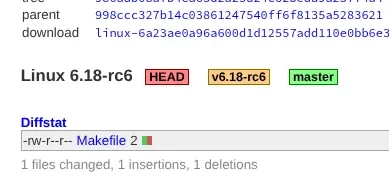Compiler Explorer - Haskell
-- See "Ponder This" Nov 2025
-- https://research.ibm.com/haifa/ponderthis/challenges/November2025.html
import Control.Monad hiding (join)
-- Note this is expository code and contains far more than the solution
-- which is just a couple of lines.
-- First we write a naive solution that works for really small problems.
-- Just for testing.
-- church n f x: Church numeral, ie. apply f n times to x.
church 0 f x = x
church n f x = church (n - 1) f (f x)
-- First problem
rewrite1 'G' = "T"
rewrite1 'T' = "CA"
rewrite1 'C' = "TG"
rewrite1 'A' = "C"
-- Print result of applying rewrite 5 times to "cat"
test1 = do
putStrLn $ "Rewrite1^5 \"CAT\":"
print $ church 5 (concatMap rewrite1) "CAT"
-- As a warmup consider this rewrite system:
-- 0 -> 1
-- 1 -> 10
-- It's not hard to show that after k rewrites
-- ...0 ends up with this length...
len0 k = fib (k + 1)
-- and 1 ends up with this length...
len1 k = fib (k + 2)
fib :: Integer -> Integer
fib n =
fst (fib' n)
where
fib' 0 = (0, 1)
fib' k =
let (a, b) = fib' (k `div` 2)
c = a * (2 * b - a)
d = a * a + b * b
in if odd k
then (d, c + d)
else (c, d)
-- I want two slightly different implementations
-- with two different string representations.
-- So let me abstract a bit to save typing:
class StringLike a where
-- Make a string from a single character.
single :: Char -> a
-- Concatenate one string after another of given length.
join :: a -> Integer -> a -> a
-- We want a lazy representation of strings so that when we
-- concatenate together more than the number of atoms in the
-- universe we don't run out of memory.
-- Define a "rope" to be function which when given `i` tells you
-- what character is at position `i`.
type UltraLazyString = Integer -> Char
instance StringLike UltraLazyString where
join f l g i = if i < l then f i else g (i - l)
single c = const c
-- First note that with these rules:
-- G -> T
-- T -> CA
-- C -> TG
-- A -> C
-- Then under quotient G, A -> 0 and T, C -> 1 we get the same
-- rules as the 01 rewrite. So we can reuse `len0` and `len1`
-- to compute the lengths.
-- Here's a generic implementation for applying a rewrite
-- of the form x -> y
rule1:: StringLike a => Char -> (Integer -> a) -> Integer -> a
rule1 letter c' k = if k == 0
then single letter
else c' (k - 1)
-- Here's a generic implementation for applying a rewrite
-- of the form x -> yz assuming that `rewrite^k y` is `len1 k`.
rule2:: StringLike a => Char -> (Integer -> a) -> (Integer -> a) -> Integer -> a
rule2 letter c' a' k = if k == 0
then single letter
else let k' = k - 1 in join (c' k') (len1 k') (a' k')
-- Now the rules as given.
g, t, c, a :: StringLike r => Integer -> r
g = rule1 'G' t
t = rule2 'T' c a
c = rule2 'C' t g
a = rule1 'A' c
-- Redo the naive computation as a check.
test2 = do
putStrLn $ "redo of rewrite1^5 \"cat\":"
print $ [(c 5 :: UltraLazyString) i | i <- [0..len1 5 - 1]]
++ [(a 5 :: UltraLazyString) i | i <- [0..len0 5 - 1]]
++ [(t 5 :: UltraLazyString) i | i <- [0..len1 5 - 1]]
-- We need two tricks:
-- 1. The obvious one that we only need `rewrite1^k` "c" because it is
-- already very long.
-- 2. We only need `k` to be 500 or less or so because applying `k` an even number
-- of times just keeps extending the string and 500 iterations gets you
-- something longer than 10^100.
-- These are strange tricks because they both involve writing less code :)
-- So magically we can get away with the following.
-- It's 10^100 (or whatever) times faster than the naive solution but
-- not instant.
test3 = do
putStrLn $ "Solution to first problem:"
print [c @UltraLazyString 500 i | i <- [10 ^ 100 .. 10 ^ 100 + 1000 - 1]]
-- But we can do better:
-- Now define a string to be a function that given a range (instead
-- of one index) prepends the appropriate substring to a list of
-- characters.
type UltraLazyString' = Integer -> Integer -> [Char] -> [Char]
-- When we join two strings we need to handle the case where
-- the range we request is split between the summands.
instance StringLike UltraLazyString' where
join f l g i j = if j < l
-- range falls in f
then f i j
else if i >= l
-- range falls in g
then g (i - l) (j - l)
-- split over f and g.
else f i l . g 0 (j - l)
single c i j = if j > i then (c :) else id
test4 = do
putStrLn $ "Better solution to first problem"
print $ c @UltraLazyString' 500 (10 ^ 100) (10 ^ 100 + 1000) []
-- Now the second problem
-- G -> T,
-- T -> CA,
-- C -> BR,
-- A -> I,
-- R -> B,
-- B -> IS,
-- I -> TG,
-- S -> C
-- Under the quotient R, G -> G; B, T -> T; I, C -> C; S, A -> A we get same rules
-- as the first problem so again so lengths can be computed with `len0` and `len1`.
-- The code is just like before.
rewrite2 'G' = "T"
rewrite2 'T' = "CA"
rewrite2 'C' = "BR"
rewrite2 'A' = "I"
rewrite2 'R' = "B"
rewrite2 'B' = "IS"
rewrite2 'I' = "TG"
rewrite2 'S' = "C"
g', t', c', a', r', b', i', s' :: StringLike r => Integer -> r
g' = rule1 'G' t'
t' = rule2 'T' c' a'
c' = rule2 'C' b' r'
a' = rule1 'A' i'
r' = rule1 'R' b'
b' = rule2 'B' i' s'
i' = rule2 'I' t' g'
s' = rule1 'S' c'
-- A quick check
test5 = do
putStrLn $ "Naive method rewrite2^10 \"R\":"
print $ church 10 (concatMap rewrite2) "R"
putStrLn $ "Fast method to rewrite2^10 \"R\":"
print $ r' @UltraLazyString' 10 0 (len1 10) []
-- Repeating the comments above (except we now have period 4 instead of 2)
-- we can write:
test6 = do
putStrLn $ "Solution to second problem"
print $ r' @UltraLazyString' 500 (10 ^ 100) (10 ^ 100 + 1000) []
main = do
test1
test2
test3
test4
test5
test6
godbolt.org
 まほろば
まほろば
































